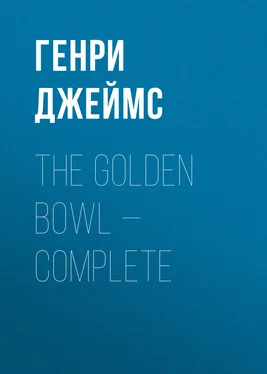Генри Джеймс - The Golden Bowl — Complete
Здесь есть возможность читать онлайн «Генри Джеймс - The Golden Bowl — Complete» — ознакомительный отрывок электронной книги совершенно бесплатно, а после прочтения отрывка купить полную версию. В некоторых случаях можно слушать аудио, скачать через торрент в формате fb2 и присутствует краткое содержание. Жанр: foreign_prose, foreign_antique, на английском языке. Описание произведения, (предисловие) а так же отзывы посетителей доступны на портале библиотеки ЛибКат.
- Название:The Golden Bowl — Complete
- Автор:
- Жанр:
- Год:неизвестен
- ISBN:нет данных
- Рейтинг книги:3 / 5. Голосов: 1
-
Избранное:Добавить в избранное
- Отзывы:
-
Ваша оценка:
- 60
- 1
- 2
- 3
- 4
- 5
The Golden Bowl — Complete: краткое содержание, описание и аннотация
Предлагаем к чтению аннотацию, описание, краткое содержание или предисловие (зависит от того, что написал сам автор книги «The Golden Bowl — Complete»). Если вы не нашли необходимую информацию о книге — напишите в комментариях, мы постараемся отыскать её.
The Golden Bowl — Complete — читать онлайн ознакомительный отрывок
Ниже представлен текст книги, разбитый по страницам. Система сохранения места последней прочитанной страницы, позволяет с удобством читать онлайн бесплатно книгу «The Golden Bowl — Complete», без необходимости каждый раз заново искать на чём Вы остановились. Поставьте закладку, и сможете в любой момент перейти на страницу, на которой закончили чтение.
Интервал:
Закладка:
One of the most comfortable things between the husband and the wife meanwhile—one of those easy certitudes they could be merely gay about—was that she never admired him so much, or so found him heartbreakingly handsome, clever, irresistible, in the very degree in which he had originally and fatally dawned upon her, as when she saw other women reduced to the same passive pulp that had then begun, once for all, to constitute HER substance. There was really nothing they had talked of together with more intimate and familiar pleasantry than of the license and privilege, the boundless happy margin, thus established for each: she going so far as to put it that, even should he some day get drunk and beat her, the spectacle of him with hated rivals would, after no matter what extremity, always, for the sovereign charm of it, charm of it in itself and as the exhibition of him that most deeply moved her, suffice to bring her round. What would therefore be more open to him than to keep her in love with him? He agreed, with all his heart, at these light moments, that his course wouldn’t then be difficult, inasmuch as, so simply constituted as he was on all the precious question—and why should he be ashamed of it?—he knew but one way with the fair. They had to be fair—and he was fastidious and particular, his standard was high; but when once this was the case what relation with them was conceivable, what relation was decent, rudimentary, properly human, but that of a plain interest in the fairness? His interest, she always answered, happened not to be “plain,” and plainness, all round, had little to do with the matter, which was marked, on the contrary, by the richest variety of colour; but the working basis, at all events, had been settled—the Miss Maddocks of life been assured of their importance for him. How conveniently assured Maggie—to take him too into the joke—had more than once gone so far as to mention to her father; since it fell in easily with the tenderness of her disposition to remember she might occasionally make him happy by an intimate confidence. This was one of her rules-full as she was of little rules, considerations, provisions. There were things she of course couldn’t tell him, in so many words, about Amerigo and herself, and about their happiness and their union and their deepest depths—and there were other things she needn’t; but there were also those that were both true and amusing, both communicable and real, and of these, with her so conscious, so delicately cultivated scheme of conduct as a daughter, she could make her profit at will. A pleasant hush, for that matter, had fallen on most of the elements while she lingered apart with her companion; it involved, this serenity, innumerable complete assumptions: since so ordered and so splendid a rest, all the tokens, spreading about them, of confidence solidly supported, might have suggested for persons of poorer pitch the very insolence of facility. Still, they weren’t insolent—THEY weren’t, our pair could reflect; they were only blissful and grateful and personally modest, not ashamed of knowing, with competence, when great things were great, when good things were good, and when safe things were safe, and not, therefore, placed below their fortune by timidity which would have been as bad as being below it by impudence. Worthy of it as they were, and as each appears, under our last possible analysis, to have wished to make the other feel that they were, what they most finally exhaled into the evening air as their eyes mildly met may well have been a kind of helplessness in their felicity. Their rightness, the justification of everything—something they so felt the pulse of—sat there with them; but they might have been asking themselves a little blankly to what further use they could put anything so perfect. They had created and nursed and established it; they had housed it here in dignity and crowned it with comfort; but mightn’t the moment possibly count for them—or count at least for us while we watch them with their fate all before them—as the dawn of the discovery that it doesn’t always meet ALL contingencies to be right? Otherwise why should Maggie have found a word of definite doubt—the expression of the fine pang determined in her a few hours before—rise after a time to her lips? She took so for granted moreover her companion’s intelligence of her doubt that the mere vagueness of her question could say it all. “What is it, after all, that they want to do to you?” “They” were for the Princess too the hovering forces of which Mrs. Rance was the symbol, and her father, only smiling back now, at his ease, took no trouble to appear not to know what she meant. What she meant—when once she had spoken—could come out well enough; though indeed it was nothing, after they had come to the point, that could serve as ground for a great defensive campaign. The waters of talk spread a little, and Maggie presently contributed an idea in saying: “What has really happened is that the proportions, for us, are altered.” He accepted equally, for the time, this somewhat cryptic remark; he still failed to challenge her even when she added that it wouldn’t so much matter if he hadn’t been so terribly young. He uttered a sound of protest only when she went to declare that she ought as a daughter, in common decency, to have waited. Yet by that time she was already herself admitting that she should have had to wait long—if she waited, that is, till he was old. But there was a way. “Since you ARE an irresistible youth, we’ve got to face it. That, somehow, is what that woman has made me feel. There’ll be others.”
X
To talk of it thus appeared at last a positive relief to him. “Yes, there’ll be others. But you’ll see me through.”
She hesitated. “Do you mean if you give in?”
“Oh no. Through my holding out.”
Maggie waited again, but when she spoke it had an effect of abruptness. “Why SHOULD you hold out forever?”
He gave, none the less, no start—and this as from the habit of taking anything, taking everything, from her as harmonious. But it was quite written upon him too, for that matter, that holding out wouldn’t be, so very completely, his natural, or at any rate his acquired, form. His appearance would have testified that he might have to do so a long time—for a man so greatly beset. This appearance, that is, spoke but little, as yet, of short remainders and simplified senses—and all in spite of his being a small, spare, slightly stale person, deprived of the general prerogative of presence. It was not by mass or weight or vulgar immediate quantity that he would in the future, any more than he had done in the past, insist or resist or prevail. There was even something in him that made his position, on any occasion, made his relation to any scene or to any group, a matter of the back of the stage, of an almost visibly conscious want of affinity with the footlights. He would have figured less than anything the stage-manager or the author of the play, who most occupy the foreground; he might be, at the best, the financial “backer,” watching his interests from the wing, but in rather confessed ignorance of the mysteries of mimicry. Barely taller than his daughter, he pressed at no point on the presumed propriety of his greater stoutness. He had lost early in life much of his crisp, closely-curling hair, the fineness of which was repeated in a small neat beard, too compact to be called “full,” though worn equally, as for a mark where other marks were wanting, on lip and cheek and chin. His neat, colourless face, provided with the merely indispensable features, suggested immediately, for a description, that it was CLEAR, and in this manner somewhat resembled a small decent room, clean-swept and unencumbered with furniture, but drawing a particular advantage, as might presently be noted, from the outlook of a pair of ample and uncurtained windows. There was something in Adam Verver’s eyes that both admitted the morning and the evening in unusual quantities and gave the modest area the outward extension of a view that was “big” even when restricted to stars. Deeply and changeably blue, though not romantically large, they were yet youthfully, almost strangely beautiful, with their ambiguity of your scarce knowing if they most carried their possessor’s vision out or most opened themselves to your own. Whatever you might feel, they stamped the place with their importance, as the house-agents say; so that, on one side or the other, you were never out of their range, were moving about, for possible community, opportunity, the sight of you scarce knew what, either before them or behind them. If other importances, not to extend the question, kept themselves down, they were in no direction less obtruded than in that of our friend’s dress, adopted once for all as with a sort of sumptuary scruple. He wore every day of the year, whatever the occasion, the same little black “cut away” coat, of the fashion of his younger time; he wore the same cool-looking trousers, chequered in black and white—the proper harmony with which, he inveterately considered, was a sprigged blue satin necktie; and, over his concave little stomach, quaintly indifferent to climates and seasons, a white duck waistcoat. “Should you really,” he now asked, “like me to marry?” He spoke as if, coming from his daughter herself, it MIGHT be an idea; which, for that matter, he would be ready to carry out should she definitely say so.
Читать дальшеИнтервал:
Закладка:
Похожие книги на «The Golden Bowl — Complete»
Представляем Вашему вниманию похожие книги на «The Golden Bowl — Complete» списком для выбора. Мы отобрали схожую по названию и смыслу литературу в надежде предоставить читателям больше вариантов отыскать новые, интересные, ещё непрочитанные произведения.
Обсуждение, отзывы о книге «The Golden Bowl — Complete» и просто собственные мнения читателей. Оставьте ваши комментарии, напишите, что Вы думаете о произведении, его смысле или главных героях. Укажите что конкретно понравилось, а что нет, и почему Вы так считаете.












